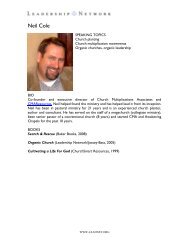ARE WE A PEOPLE AT HALF TIME? - Leadership Network
ARE WE A PEOPLE AT HALF TIME? - Leadership Network
ARE WE A PEOPLE AT HALF TIME? - Leadership Network
You also want an ePaper? Increase the reach of your titles
YUMPU automatically turns print PDFs into web optimized ePapers that Google loves.
From our beginning, <strong>Leadership</strong> <strong>Network</strong>,<br />
and in turn our “customers,” have been the<br />
beneficiaries of the wisdom and counsel of<br />
Peter Drucker. Recognized as a world-wide<br />
thought leader and the “father of modern<br />
management,” Drucker has devoted much<br />
of his time and energy in recent years to<br />
working with the “third sector” comprised<br />
of nonprofit organizations and churches. ■<br />
He has often remarked that the role of management<br />
is “to make the church more<br />
churchlike, not to make the church more<br />
businesslike.” ■ In a significant essay<br />
published in the October 5, 1998 issue of<br />
Forbes, Drucker writes of the new paradigms<br />
in management and the once-valid<br />
assumptions that today are “either wrong,<br />
out-of-date or both.” ■ We thank Peter<br />
Drucker and Forbes for allowing NEXT to<br />
publish excerpts from the essay. It speaks<br />
volumes to leaders and organizations seeking<br />
to become more effective in mission and<br />
ministry in the 21st century.<br />
Effective <strong>Leadership</strong> 1-4<br />
Management’s New Paradigms<br />
Peter F. Drucker<br />
Young Leaders 5<br />
Large Church Forums 6<br />
Church Champions 6<br />
LN Recommends 7<br />
NetFax 8<br />
O U R M I S S I O N :<br />
<strong>Leadership</strong> <strong>Network</strong>’s mission is<br />
to accelerate the emergence of<br />
effective churches. We identify,<br />
connect and resource best<br />
practice, innovative church leaders<br />
and communicate what is learned<br />
to the broader church.<br />
V O L U M E 4 , N U M B E R 6 N O V E M B E R • D E C E M B E R , 1 9 9 8<br />
As we advance deeper into the<br />
knowledge economy, the basic<br />
assumptions underlying much of<br />
what is taught and practiced in the name of<br />
management are hopelessly out-of-date.<br />
As a result, we are preaching, teaching and<br />
practicing policies that are increasingly at<br />
odds with reality and therefore counterproductive.<br />
This essay attempts to re-examine<br />
these assumptions and practices. Basic<br />
assumptions about reality are the paradigms<br />
of a social science. Get the assumptions<br />
wrong and everything that follows from them<br />
is wrong.<br />
For a social discipline such as management,<br />
the assumptions are actually a good deal<br />
more important than are the paradigms for a<br />
natural science. A social discipline such as<br />
management deals with the behavior of people<br />
and human institutions. The social universe<br />
has no “natural laws” as the physical<br />
sciences do. It is thus subject to continuous<br />
change. This means that assumptions that<br />
FROM LEADERSHIP NETWORK<br />
Management’s New Paradigms<br />
Peter F. Drucker<br />
“Mission defines<br />
strategy,<br />
after all, and<br />
strategy defines<br />
structure.”<br />
PETER F. DRUCKER<br />
were valid yesterday can become invalid and,<br />
indeed, totally misleading in no time at all.<br />
That’s where we are today with the discipline<br />
of management.<br />
(Continued on page 2)<br />
What are the assumptions that<br />
are leading management astray<br />
■ That there is only one right way to<br />
organize a business.<br />
■ That the principles of management<br />
apply only to business<br />
organizations.<br />
■ That there is a single right way to<br />
manage people.<br />
■ That technologies, markets and<br />
end-uses are fixed and rarely overlap.<br />
That is, each industry has a<br />
specific technology and a specific<br />
market.<br />
■ That management’s job is to “run<br />
the business” rather than to concentrate<br />
on what is happening outside<br />
the business. That is,<br />
management is internally, not<br />
externally, focused.<br />
www.leadnet.org







